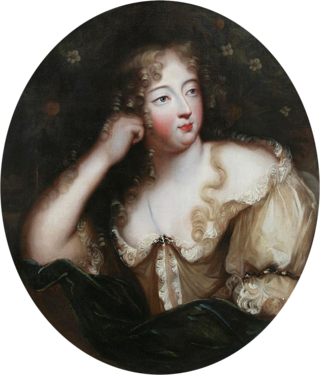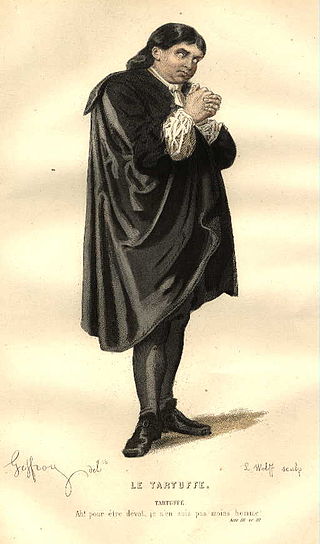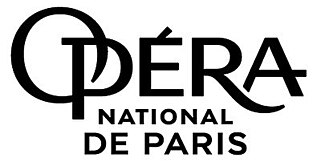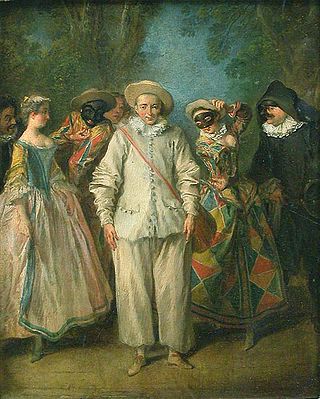
Louis XIV, also known as Louis the Great or the Sun King, was King of France from 1643 until his death in 1715. His verified reign of 72 years and 110 days is the longest of any sovereign. Although Louis XIV's France was emblematic of the Age of Absolutism in Europe, the King surrounded himself with a variety of significant political, military, and cultural figures, such as Bossuet, Colbert, Louvois, Le Brun, Le Nôtre, Lully, Mazarin, Molière, Racine, Turenne, Condé, and Vauban.

Jean-Baptiste Poquelin, known by his stage name Molière, was a French playwright, actor, and poet, widely regarded as one of the great writers in the French language and world literature. His extant works include comedies, farces, tragicomedies, comédie-ballets, and more. His plays have been translated into every major living language and are performed at the Comédie-Française more often than those of any other playwright today. His influence is such that the French language is often referred to as the "language of Molière".

The Palace of Versailles is a former royal residence built by King Louis XIV located in Versailles, about 19 kilometers (12 mi) west of Paris, France. The palace is owned by the French Republic and since 1995 has been managed, under the direction of the French Ministry of Culture, by the Public Establishment of the Palace, Museum and National Estate of Versailles. About 15,000,000 people visit the palace, park, or gardens of Versailles every year, making it one of the most popular tourist attractions in the world.

Françoise-Athénaïs de Rochechouart de Mortemart, Marquise of Montespan was the most celebrated maîtresse-en-titre of King Louis XIV, by whom she had seven children.

MonsieurPhilippe I, Duke of Orléans, was the younger son of King Louis XIII of France and his wife, Anne of Austria. His elder brother was the "Sun King", Louis XIV. Styled Duke of Anjou from birth, Philippe became Duke of Orléans upon the death of his uncle Gaston in 1660. In 1661, he also received the dukedoms of Valois and Chartres. Following Philippe's victory in battle in 1671, Louis XIV granted his brother the dukedom of Nemours, the marquisates of Coucy and Folembray, and the countships of Dourdan and Romorantin.

Angels in America: A Gay Fantasia on National Themes is a two-part play by American playwright Tony Kushner. The two parts of the play, Millennium Approaches and Perestroika, may be presented separately. The work won numerous awards, including the Pulitzer Prize for Drama, the Tony Award for Best Play, and the Drama Desk Award for Outstanding Play. Part one of the play premiered in 1991, followed by part two in 1992. Its Broadway opening was in 1993.

The Régence was the period in French history between 1715 and 1723 when King Louis XV was considered a minor and the country was instead governed by Philippe d'Orléans as prince regent.

Tartuffe, or The Impostor, or The Hypocrite, first performed in 1664, is a theatrical comedy by Molière. The characters of Tartuffe, Elmire, and Orgon are considered among the greatest classical theatre roles.
In the French courts during the 17th Century, ballet first begins to flourish with the help of several important men: King Louis XIV, Jean-Baptiste Lully, Pierre Beauchamps, and Molière. The combination of different talents and passions of these four men shaped ballet to what it is today.

17th-century French literature was written throughout the Grand Siècle of France, spanning the reigns of Henry IV of France, the Regency of Marie de Medici, Louis XIII of France, the Regency of Anne of Austria and the reign of Louis XIV of France. The literature of this period is often equated with the Classicism of Louis XIV's long reign, during which France led Europe in political and cultural development; its authors expounded the classical ideals of order, clarity, proportion and good taste. In reality, 17th-century French literature encompasses far more than just the classicist masterpieces of Jean Racine and Madame de La Fayette.

L. Scott Caldwell is an American actress perhaps best known for her roles as Deputy U.S. Marshall Erin Poole in The Fugitive (1993) and Rose on the television series Lost.
Nick Dear is an English writer for stage, screen and radio. He received a BAFTA for his first screenwriting credit, a film adaptation of Jane Austen's Persuasion.

The Paris Opera is the primary opera and ballet company of France. It was founded in 1669 by Louis XIV as the Académie d'Opéra, and shortly thereafter was placed under the leadership of Jean-Baptiste Lully and officially renamed the Académie Royale de Musique, but continued to be known more simply as the Opéra. Classical ballet as it is known today arose within the Paris Opera as the Paris Opera Ballet and has remained an integral and important part of the company. Currently called the Opéra national de Paris, it mainly produces operas at its modern 2,723-seat theatre Opéra Bastille which opened in 1989, and ballets and some classical operas at the older 1,979-seat Palais Garnier which opened in 1875. Small scale and contemporary works are also staged in the 500-seat Amphitheatre under the Opéra Bastille.
René Zagger is an English actor, known for playing PC Nick Klein in The Bill from 1999 to 2004 and as the voice of Emet-Selch in Final Fantasy XIV from the Stormblood expansion onward. He has also made several guest appearances in Casualty, Doctors and Wycliffe.
Le Roi Soleil is a French musical about the life of Louis XIV. It premiered on 22 September 2005 at the Palais des Sports in Paris.
The Menus-Plaisirs du Roi was, in the organisation of the French royal household under the Ancien Régime, the department of the Maison du Roi responsible for the "lesser pleasures of the King", which meant in practice that it was in charge of all the preparations for ceremonies, events and festivities, down to the last detail of design and order.

Comédie-Italienne or Théâtre-Italien are French names which have been used to refer to Italian-language theatre and opera when performed in France.

The Royal Opera of Versailles is the main theatre and opera house of the Palace of Versailles. Designed by Ange-Jacques Gabriel, it is also known as the Théâtre Gabriel. The interior decoration by Augustin Pajou is constructed almost entirely of wood, painted to resemble marble in a technique known as faux marble. The excellent acoustics of the opera house are at least partly due to its wooden interior.

Ballet is a formalized form of dance with its origins in the Italian Renaissance courts of 15th and 16th centuries. Ballet spread from Italy to France with the help of Catherine de' Medici, where ballet developed even further under her aristocratic influence. An early example of Catherine's development of ballet is through 'Le Paradis d' Amour', a piece of work presented at the wedding of her daughter Marguerite de Valois to Henry of Navarre. Aristocratic money was responsible for the initial stages of development in 'court ballet', as it was royal money that dictated the ideas, literature and music used in ballets that were created to primarily entertain the aristocrats of the time. The first formal 'court ballet' ever recognized was staged in 1573, 'Ballet des Polonais'. In true form of royal entertainment, 'Ballet des Polonais' was commissioned by Catherine de' Medici to honor the Polish ambassadors who were visiting Paris upon the accession of Henry of Anjou to the throne of Poland. In 1581, Catherine de' Medici commissioned another court ballet, Ballet Comique de la Reine, however it was her compatriot, Balthasar de Beaujoyeulx, who organized the ballet. Catherine de' Medici and Balthasar de Beaujoyeulx were responsible for presenting the first court ballet ever to apply the principles of Baif's Academie, by integrating poetry, dance, music and set design to convey a unified dramatic storyline. Moreover, the early organization and development of 'court ballet' was funded by, influenced by and produced by the aristocrats of the time, fulfilling both their personal entertainment and political propaganda needs.

The Théâtre des Tuileries was a theatre in the former Tuileries Palace in Paris. It was also known as the Salle des Machines, because of its elaborate stage machinery, designed by the Italian theatre architects Gaspare Vigarani and his two sons, Carlo and Lodovico. Constructed in 1659–1661, it was originally intended for spectacular productions mounted by the court of the young Louis XIV, but in 1763 the theatre was greatly reduced in size and used in turn by the Paris Opera, the Comédie-Française, and the Théâtre de Monsieur. In 1808 Napoleon had a new theatre/ballroom built to the designs of the architects Percier and Fontaine. The Tuileries Palace and the theatre were destroyed by fire on 24 May 1871, during the Paris Commune.













